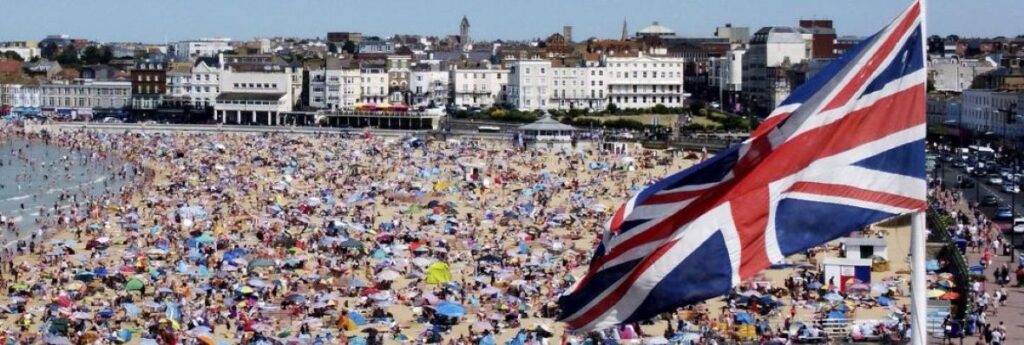With Britain preparing to face record temperatures this week, firefighters battled wildfires raging out of control in France and Spain on the weekend as Europe wilted under an unusually extreme heat wave that authorities in Madrid blamed for hundreds of deaths.
Two huge blazes, which have consumed pine forests for six days in southwestern France, have forced the evacuation of some 14,000 people. Water-dropping planes zig-zagged the area near Bordeaux, as flames lapped at the edge of a farm field, and smoke blanketed the skyline above a mass of singed trees, in images shared by firefighters.
In Spain, firefighters supported by military brigades tried to stamp out over 30 fires consuming forests spread across the country. Spain’s National Defense Department said that “the majority” of its fire-fighting aircraft have been deployed to reach the blazes, many of which are in rugged, hilly terrain that is difficult for ground crews to access.
Fire season has hit parts of Europe earlier than usual this year after a dry, hot spring that the European Union has attributed to climate change. Some countries are also experiencing extended droughts, while many are sweltering in heat waves.
So far, there have been no fire-related deaths in France or Spain. In Portugal, a pilot of a firefighting plane died when his aircraft crashed on Friday.
But as temperatures remained unusually high, heat-related deaths soared. In Spain’s second heat wave of the summer, many areas have repeatedly seen peaks of 43 degrees Celsius. According to Spain’s Carlos III Institute, which records temperature-related fatalities daily, 360 deaths were attributed to high temperatures from July 10 to 15. That was compared with 27 temperature-related deaths the previous six days.
Emergency officials warned that high temperatures and winds Sunday and Monday would complicate efforts to stop the fires from spreading further.
Some of the most worrisome blazes in Spain are concentrated in the western regions of Extremadura and Castilla y León. Drought conditions in the Iberian Peninsula have made it particularly susceptible to wildfires. Since last October, Spain has accumulated 25% less rainfall than is considered normal — and some areas have received as much as 75% less than normal, the National Security Department said.
While some fires have been caused by lightning strikes and others the result of human negligence, a blaze that broke out in a nature reserve in Extremadura called La Garganta de los Infiernos, or “The Throat of Hell,” was suspected to be the result of arson, regional authorities said.
Hungary, Croatia and the Greek island of Crete also fought wildfires last week and Italy is in the midst of an early summer heat wave, coupled with the worst drought in its north in 70 years.
Scorching temperatures have even reached northern Europe. An annual four-day walking event in the Dutch city of Nijmegen announced Sunday that it would cancel the first day, scheduled for Tuesday, when temperatures are expected to peak at around 39C.
UK
Meanwhile, Britain’s weather agency issued its first-ever “red warning” of extreme heat for Monday and Tuesday, when temperatures in southern England may reach 40C for the first time. The British heat record is 38.7C set in 2019
College of Paramedics Chief Executive Tracy Nicholls warned Sunday that the “ferocious heat” could “ultimately, end in people’s deaths.”
Cabinet Office Minister Kit Malthouse warned that transport services will be significantly affected.
“The heat will affect rails, for example, so the trains have to run slower. There may be fewer services,″ he told the BBC. “People need to be on their guard for disruption. If they don’t have to travel, this may be a moment to work from home.”
Rail passengers and users of the London Underground subway system were being advised not to travel on Monday and Tuesday unless it’s absolutely necessary.
The alert comes as scientists say climate change is increasing the likelihood of exceptional heat waves in Britain, a country unaccustomed to such temperatures. Few homes, apartments, schools, or small businesses in the country have air conditioning.
Britain usually has moderate summer temperatures. Across the UK, average July temperatures range from a daily high of 21C to a low of 12C.

